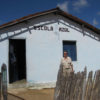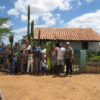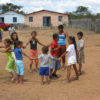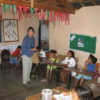Why Save the Spix’s Macaw School?
Well, read on for founders’ of Parrots International, Mark and Marie Stafford, personal experience with the children of the school………
Why save the Spix's Macaw School?...................... Well, read on:
In August of 2006 Mark and Marie Stafford self-financed a Parrots International trip to the area south of Curaça, Brazil, the historical habitat of the Spix's Macaw, extinct in the wild since October 2000. This is their story:
“We were joined in Curaça, Brazil by Dr. Yara Barros, PhD., the field coordinator for the former Spix's Macaw Project. The Spix's Macaw Project, largely funded by Loro Parque Foundation, ceased operations in Curaça in 2002, two years after the last Spix's Macaw disappeared from the wild.
Although it had been four years since the last researcher left Curaça, as we explored the former Spix's habitat were amazed at the commitment the community still has for the Spix's Macaw. Of significance is the innate respect the local people have for their wildlife and birds.
Case in point:
Early one morning, prior to day break, we had driven down one wisp of a dirt road to investigate an area of Spix's habitat called the Gangorra Farm. In the early dawn we passed by two small farm houses without stopping to attempt to arrive into field before daybreak that morning to view and photograph Illiger's Macaws as they arrived in the tree tops. We drove about 4 kilometers past the last house, drove off-road down over hills and through caatinga brush, parked, and then hiked down into the Riacho Melancia creek bed. Later in the morning, as the heat of the Caatinga grew, and as Marie and I were busy taking photos and videos of Illiger's from the dry creek bed, we noticed three distant figures lurking around our red truck still parked in the distance. The figures then tracked our footsteps down into the creek, shadowed us behind the creek bank shrubbery, and mysteriously disappeared. Very spooky and disconcerting.
Later, when we headed back toward Curaça, re-tracing our drive, as we passed first small farm house the same three figures ran out in front of our truck. They were three children! (perhaps age 16 to 10). They called their father out from inside the farm house as they blocked our path. Their father explained that the children had tracked our truck four kilometers on foot, through the heat of the caatinga, and recorded our license plate, as they thought we were trappers looking for wild endemic canaries! Where would you ever expect to find that!....four years after the project left the Curaça!! We had been tracked and followed by children!!! The children from the tiny local Spix's Macaw School! Obviously someone had done a fantastic job of education and community awareness during the past. You couldn't buy that community awareness and commitment for any amount of money. This amazing enthusiastic community support is a dream for a future reintroduction program for the Spix's Macaw.
Based on that experience, Parrots International donated on the spot to keep the Spix's Macaw School open and began a campaign to save the Spix's Macaw School. We also committed to continue the support of the Spix's Macaw School and the children for their future, and for the potential future reintroduction of the Spix's Macaw. The Spix's Macaw School, located in one of the poorest areas of Brazil, had only 25 students, ages 5 through 16, enrolled in day classes.
The long range goal of the Spix’s Macaw Project, of which Parrots International is a member, is the reintroduction of the Spix's Macaw into its historical habitat. The realization of this goal, The reintroduction and the subsequent protection of the reintroduced Spix’s Macaws and their habitat, is only possible if the local people truly believe that the species must be saved. To achieve this, the Spix's Macaw Project members are working with the local community, before the reintroduction project begins, to demonstrate that the Spix's Macaw reintroduction and conservation is a win/win for both the community and the Spix's Macaw. This is what will assure the long term survival of the species. The support for the Spix’s Macaw School has been a very important conservation tool to achieve this goal. The support of the Spix's Macaw School has helped provide the groundwork for the future introduction of the Spix's Macaw which will occur on the adjacent Spix’s Macaw Reserve.”
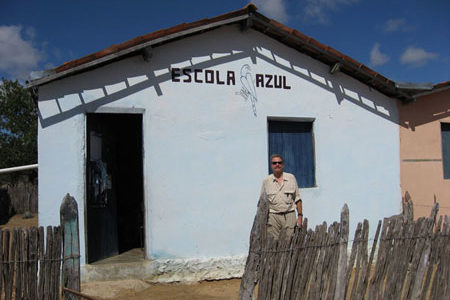 The Spix Macaw School. Mark Stafford, president of Parrots International in foreground. Photo by M. Stafford
The Spix Macaw School. Mark Stafford, president of Parrots International in foreground. Photo by M. Stafford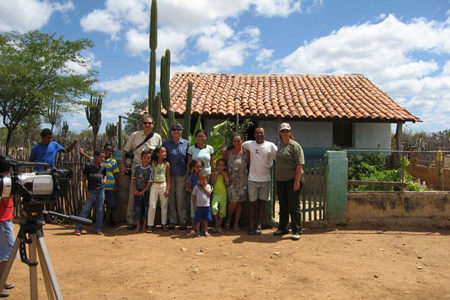 Spix’s Macaw School students and teachers. Yara Barros PhD, Spix's Macaw researcher, on right. Mark and Marie Stafford left rear. Photo by M. Stafford
Spix’s Macaw School students and teachers. Yara Barros PhD, Spix's Macaw researcher, on right. Mark and Marie Stafford left rear. Photo by M. Stafford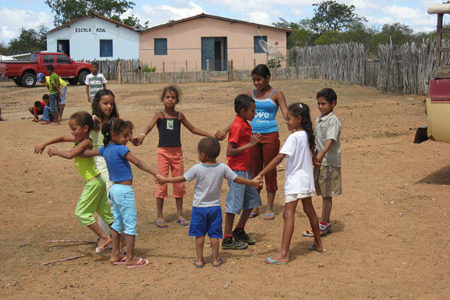 Recess at the Spix’s Macaw School. Photo by M. Stafford
Recess at the Spix’s Macaw School. Photo by M. Stafford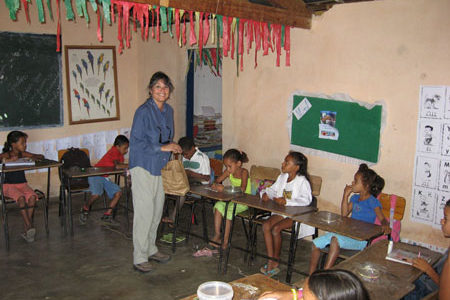 Marie Stafford distributes gifts to the children of the Spix’s Macaw School. Photo by M. Stafford
Marie Stafford distributes gifts to the children of the Spix’s Macaw School. Photo by M. Stafford
Project Partners
- Parrots International
- The Lymington Foundation, Brazil
- Al Wabra Wildlife Preservation, Qatar
- ACTP, Germany
- Voglepark Walsrode, Germany
- IBAMA (Institute Chico Mendes of Biodiversity Conservation)
The Spix's Macaw School was originally built in 1995 through a partnership between the Spix's Macaw Project, who sponsored the construction material, and the community, who gathered together to build the school. The name of the school was chosen by the children.
The school is located in the Fazenda Pau de Colher, in the former range of the Spix's Macaw. After the Spix's Macaw Project suspended its activities in 2002 the Project ended support of the school (the last Spix's Macaw in the wild disappeared in October 2000) and the school had suffered economic hardship. The teacher's salary for daytime classes and lunch were funded by the City Hall but not in sufficient amounts to provide for basic educational requirements. "The governmental powers that be" in Town of Curaça, an hour and a half drive north of the school, were considering closing the Spix's Macaw School due to lack of funds. Those same politicians had cut the funding for the "Spix's School bus," an old pickup truck.
Parrots International and partners joined to donate funds to help save the Spix's Macaw School. It is some of the best money that could be placed into an investment toward future plans for Spix's Reintroduction.
In June 2007, Parrots International sent the original donation restart the Spix’s Macaw School Project, to furnish the Spix’s Macaw classroom with new desks and supplies, and then an additional donation to fund the school for another year. At that time Parrots International and Lymington Foundation created the Spix’s Macaw School Partnership which grew to include the partners AWWP, ACTP, Vogelpark Walsrode, NPRPS, and IBAMA/ICMBio.
In March 2008 Parrots International funded another priority...the establishment of night classes. Thanks to the help of Dr. Yara Barros, Ph.D., conversations with the teachers of the Spix's Macaw School (Lidia and Maria) revealed that many adults of the region were interested in learning basic reading and writing, however there was no funding from the City Hall for this education. Therefore, the partnership funded the teachers’ salaries to open evening classes at the Spix's Macaw School for the local adults that had not had the opportunity to attend school and learn to read and write. Adults (ages 16+) attending night classes must miss their evening meal with their families to be able to participate. Therefore we (the partners and supporters) are donated to provide an evening meal for each night class attendee.
In October 2008 the construction of a second classroom, doubling the size of the Spix’s Macaw School, was planned.
In October 2008 the addition to the Spix’s Macaw School was completed. The construction and completion was funded by Parrots International thanks to a generous donation of US $10,000 by Voglepark Walsrode. The labor was provided by the local community volunteers. The new addition greatly improves the facility and increased the services that the Spix’s Macaw could provide to the community surrounding the possible release site for the reintroduction of the Spix’s Macaw.
The addition more than doubled the size of the school and included a second classroom, kitchen, stove, and a sanitary bathroom (a first for the community).
The school continued to gain generous support from AWWP in ensuing years , and the Partnership acknowledges AWWP’s major contributions to maintaining the school’s funding.
Unfortunately, the Curaça School District has recently closed the Spix’s School and moved students closer to the town of Curaça.
Perhaps the future will allow partners to reopen the school.





